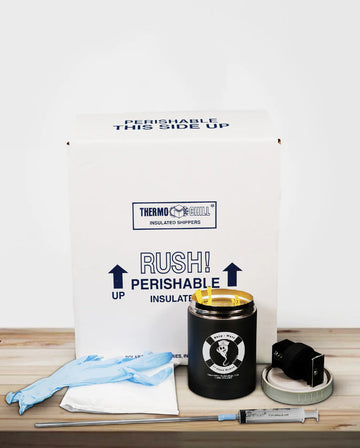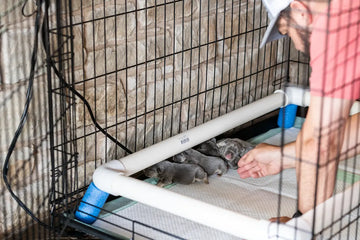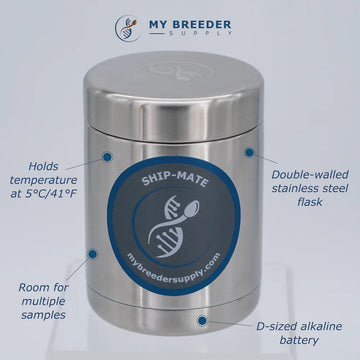
Canine Parvovirus is a highly contagious and potentially fatal disease that affects dogs of all ages, but especially young puppies. As a responsible dog breeder, it's crucial to prioritize the health and well-being of your pups by employing proper testing measures, such as Parvo testing. In this comprehensive article, we will explore why dog breeders need to use Parvo testing, the benefits it provides, available testing methods, and frequently asked questions to help you make informed decisions and protect your precious canine companions.
The Importance of Parvo Testing for Dog Breeders

Understanding Canine Parvovirus
Canine Parvovirus (CPV) is a highly contagious viral disease that can cause severe gastrointestinal distress, dehydration, and even death in dogs. Puppies aged six weeks to six months are particularly susceptible due to their developing immune systems. CPV is resistant to many disinfectants and can survive in the environment for long periods, making it a formidable threat to dog breeders.
Benefits of Parvo Testing for Dog Breeders
Early detection:
Parvo testing allows breeders to identify infected dogs before they show visible symptoms, helping to prevent the spread of the virus within the breeding facility and ensuring timely medical intervention.
Protecting uninfected dogs:
By identifying and isolating infected dogs, breeders can protect healthy pups from contracting the virus.
Maintaining reputation:
A breeder with healthy, Parvo-free puppies will earn a trustworthy reputation, resulting in satisfied customers and long-term success.
Compliance with regulations:
Parvo testing may be required by certain breed clubs, local laws, or other governing bodies. Staying compliant with these regulations helps avoid potential legal issues.
Parvo Testing Methods

Polymerase Chain Reaction (PCR)
PCR testing is a highly sensitive and accurate method that detects the presence of Parvovirus DNA in fecal samples. This test is capable of identifying the virus even in low concentrations, making it a reliable option for early detection.
Enzyme-Linked Immunosorbent Assay (ELISA)
ELISA testing is a rapid, cost-effective, and widely available method for detecting Parvovirus antigens in fecal samples. This test is commonly used in veterinary clinics and can provide results within minutes.
Hemagglutination (HA) Test
The HA test is an older, less-commonly used method for detecting Parvovirus. It involves examining blood samples for the presence of virus-induced clumping of red blood cells. This test is less sensitive and specific compared to PCR and ELISA methods.
Further Recommendations for Dog Breeders

To enhance your breeding facility's safety and health standards, consider implementing these additional recommendations:
Establish a Strong Relationship with Your Veterinarian
A strong partnership with a trusted veterinarian is crucial for any dog breeder. Your veterinarian will not only provide guidance on Parvo testing and vaccinations but also offer valuable advice on the overall health and well-being of your dogs. Regular check-ups and open communication with your veterinarian can help you stay proactive and address potential health issues promptly.
Develop a Comprehensive Biosecurity Plan
A well-designed biosecurity plan can significantly reduce the risk of infectious diseases, including Parvo, spreading within your breeding facility. Key components of an effective biosecurity plan include:
- Controlled access to the facility: Limit the number of people allowed to interact with your dogs, especially those who come into contact with other animals.
- Personal protective equipment (PPE): Provide disposable gloves, shoe covers, and gowns for staff and visitors to minimize the risk of contamination.
- Designated areas for dogs: Separate dogs based on their age, health status, and vaccination records to reduce the risk of cross-contamination.
- Waste management: Implement a proper waste disposal system to minimize the spread of pathogens.
Educate Yourself and Your Staff
Staying informed about the latest developments in canine health, disease prevention, and breeding practices is essential for responsible breeders. Attend seminars, workshops, and conferences, and encourage your staff to do the same. This ongoing education will help you stay up-to-date with the best practices and emerging trends in dog breeding.
Network with Other Reputable Breeders
Connecting with other reputable breeders can provide valuable insights and support, allowing you to share experiences and learn from one another. Networking with breeders who prioritize their dogs' health and well-being can also help you find potential clients and collaborators who share your commitment to responsible breeding.
As a dog breeder, your primary responsibility is to ensure the health, safety, and happiness of your canine companions. By incorporating Parvo testing, maintaining strict hygiene standards, and following your veterinarian's recommendations, you can reduce the risk of Parvovirus infection and provide a safe environment for your dogs to thrive.
Continuing education, networking with like-minded breeders, and developing a comprehensive biosecurity plan can further enhance your breeding practices and contribute to a successful, reputable operation. By prioritizing the well-being of your dogs, you not only protect them from potential health threats but also demonstrate your dedication to ethical breeding practices and gain the trust of potential clients.
Parvo Test Frequently Asked Questions
How often should dog breeders test for Parvo?
The frequency of testing depends on several factors, such as the prevalence of Parvo in your area and the specific protocols you have in place. Ideally, dog breeders should test new litters for Parvo at least once before they leave for their new homes. Regular testing should also be conducted on adult dogs, especially those frequently exposed to other dogs or environments with higher Parvo risks.
Can vaccinated dogs still contract Parvovirus?
While vaccination significantly reduces the risk of contracting Parvovirus, no vaccine is 100% effective. Vaccinated dogs can still contract the virus, but their symptoms may be less severe, and they may recover more quickly.
How can dog breeders prevent the spread of Parvo in their facilities?
Preventing the spread of Parvo in breeding facilities requires a combination of strict hygiene, vaccination, and testing protocols. Here are some key steps to consider:
- Vaccinate all dogs and puppies according to your veterinarian's recommended schedule.
- Use Parvo testing to identify and isolate infected dogs promptly.
- Maintain a clean and sanitized environment by regularly disinfecting surfaces, tools, and equipment with Parvo-specific disinfectants.
- Limit access to your facility and avoid exposing your dogs to high-risk environments or other dogs with unknown health statuses.
- Educate staff and visitors on proper hygiene and biosecurity measures, such as handwashing and changing clothes before interacting with the dogs.
What are the signs and symptoms of Parvo in dogs?
The signs and symptoms of Parvo in dogs can vary, but some common indicators include:
- Lethargy
- Loss of appetite
- Vomiting
- Severe diarrhea, often with blood
- Dehydration
- Fever
If you suspect a dog in your care may have contracted Parvo, consult your veterinarian immediately.
How long does it take for Parvo test results to come back?
The turnaround time for Parvo test results depends on the testing method used. ELISA tests can provide results within minutes, while PCR test results may take up to a few days, as samples are usually sent to specialized laboratories for processing. Your veterinarian can provide more specific information on expected turnaround times for the testing method they recommend.
Why dog breeders need to use Parvo testing cannot be overstated. This essential practice not only ensures the health and safety of the dogs in your care but also protects your reputation as a responsible breeder. By employing the appropriate testing methods, adhering to strict hygiene and vaccination protocols, and staying informed about the latest developments in Parvo prevention and treatment, you can minimize the risk of this devastating disease and provide your clients with healthy, happy pups.
As a dog breeder, you play a vital role in safeguarding the welfare of your canine companions. Incorporating Parvo testing into your routine is an investment in their health and a demonstration of your commitment to responsible breeding practices. Always consult with your veterinarian to establish the best course of action for your specific situation and keep the well-being of your dogs at the forefront of your decisions.




